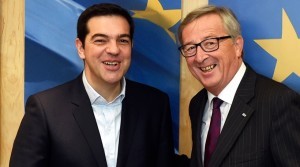Prime Minister Alexis Tsipras has travelled to Brussels today on order to meet, early in the morning, with European Commission President Jean-Claude Juncker and the head of the European Parliament, Martin Schulz.
The PM’s meeting with Martin Schulz was completed shortly before 09.30 am (Athens time). Then, Tsipras was received by Jean-Claude Juncker, who underlined in a brief statement ahead of their meeting that progress on a deal between Greece and its creditors had been insufficient.
“”I’m not satisfied with the developments in recent weeks.,” Juncker said, adding that he would make “proposals” to help overcome the differences.
“I’m totally excluding a failure…I would like Europeans to go together. This is not a time for division. This is the time for coming together,” the EC head stressed.
Juncker also underlined that the European Commission wants to play an auxiliary role and that it doesn’t want to be a major player in the negotiations.
On his part, Mr. Tsipras appeared to be optimistic and noted that “when there is political will anything is possible.”
Watch below the video of the statements made by Martin Schulz and Alexis Tsipras after their meeting.
Friday’s critical meetings come in the wake of the signing of a cooperation deal between the Greek Government and OECD on reforms on Thursday. OECD has agreed to offer the Greek side its know-how with regard to the reform planning and implementation, which are the priorities of the Greek government.
Speaking in Paris after a meeting with OECD Secretary General Angel Gurria at the organization’s headquarters, PM Tsipras said that this agreement will produce reforms that will promote social justice and economic growth, not austerity and social instability, as was the case in the past.
Asked about the disbursement of pending loan tranches, the PM said: “Right now there is a negotiation underway… On our part, we are doing whatever we can to be honest. There is no reason for concern. Even if there is no disbursement, Greece will still meet its obligations. However, if this happens, it will mean that one side is promoting the agreement while the other seeks to undermine it.”
“There is mutual suspicion between Greece and it s partners and that’s why we are here,” Tsipras noted, adding that today’s agreement with OECD confirms the country’s determination to proceed with structural reforms.
“The era of austerity, memorandums and the troika has ended,” Tsipras said, adding that Greece wanted to “create a new relationship with its European partners based on sincerity, realism and mutual understanding.”
Ask me anything
Explore related questions





